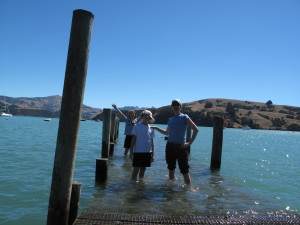One of the assumptions underlying my appointment as a Visiting Erskine Fellow at the University of Canterbury is the belief that students learn most effectively using experiential methods. Actually, as I consider this, that assumption was also a key component of my being hired as the Board of Trustees Distinguished chair in Ethics and Leadership. Increasing the type and frequency of experiential learning opportunities for Gusties is one of my four strategic focus areas. As I reflect on how classes are going here at UC, and what I am learning that is transferable back to the American learning context, it seems important to examine that assumption as a blanket statement. Sarah and I have discovered two key ethical issues in changing teaching and learning norms in a lecture-driven environment: training students to be able to engage, and, making choices that recognize our limitations in helping students debrief and manage emotionally challenging experiences they did not expect.
Clearly, I am an advocate for experiential learning methods—pretty much everything I do with respect to teaching and learning is within the experiential learning framework. From my own teaching practice, to my pedagogical research, to my editorial role with the Journal of Management Education, experiential learning is at the heart of my teaching and learning philosophy. I have been convinced of its lasting learning effects for students over the last 18 years, but, I have learned that students have to be ready for it to ‘work’ for them. For some tools I have used for a long time, like community-based learning or emotionally-significant simulations I facilitate in class, it seems sometimes like in loco parentis— getting students to do something they don’t really like because, well, it’s good for them. That tension shows up in my conversations with students and on my teaching evaluations, the great majority of time recognizing the difference between liking a course and learning from it.
In the large Organizational Behavior class here, I can facilitate experiences with some measure of impunity. In some ways, I am taking the safe side in choosing what activities to embed in the course. As Sarah and I have talked about these choices, ethics in teaching is a prominent theme. First, we’ve come to realize that actually being able to enter a classroom and engage actively is a skill I largely take for granted in my American classes. When Sarah came to the U.S. in 2011 to observe my experientially-based class facilitation, she noted that American students don’t protest when being directed to do something together. When I ask them to form groups, they do, without complaining or stalling. Even when my American students don’t get what I am doing right away, they trust that it’s for a reason, and they go along for the ride. Ramping up the ability to understand the why of experiential learning is a foundational step that is crucial in changing lecture-based norms.
Secondly, and maybe even more importantly, we can’t effectively manage any negative emotional outcomes for individual students in a large class. For that reason, we’ve made pretty conservative choices about course activities, and about timing those activities. For these first few weeks, we’ve run engaging but not terribly confronting activities, like the Person-Organization Fit card sort exercise and the perceptual differences picture interpretation exercise; based on the discussion and student comments, these were big hits and they really understood concepts the activities were designed to highlight. We’re saving the more affectively significant activities for the next few weeks. The power game, in particular, can be a very difficult experience for some students, who realize they may behave in ways they neither expected nor desired. One of the logistical changes we’ve made for the power simulation is to get more facilitators in the room—more eyes trained to look for potential disengagement or bewilderment. I don’t know how it will go. We can only think about potential downsides and try to mitigate or eliminate them through course structures. It’s much of the same consideration as a small class, but our inability to directly manage each student as well as the training issue above make considering the how of course activities so much more ethically compelling.
Outside of class adventures
Wow…


